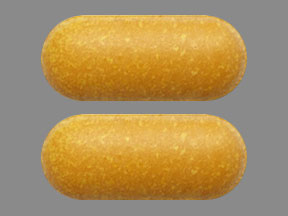
Riboflavin Coupons & Savings Card – Discount Prices from $12.09
Generic for: B-2-400, Cyto b2, Cvs vitamin b-2
Riboflavin (vitamin B2) is used to prevent or treat low levels of vitamin B2 in people who do not get enough of the vitamin from their diet. Most people who eat a normal diet do not need extra vitamin B2. However, some conditions (such as stomach/intestinal problems, prolonged infection, liver disease, alcoholism, cancer) can cause low levels of vitamin B2. Vitamin B2 plays an important role in the body. It is needed to keep your skin, eyes, nerves, and red blood cells healthy.
Our coupons are free to use. Before paying, show the pharmacist your Riboflavin savings card to get your free discount. Use our filters below to edit the prescription box to match your needs. The Riboflavin prices will update based on your prescription needs. Above our Riboflavin coupons, you can change your location to see pharmacy prices and costs in other areas. We're here to help you buy Riboflavin at the lowest price with our prescription discount card.
My prescription
Edit
400MG, Riboflavin (30 Tablets)
Select pharmacy

Albertsons
$12.09
COUPON PRICE
Walgreens
$12.09
COUPON PRICERiboflavin savings card
Show this card to your pharmacist
Albertsons
$12.09
BIN
ID
PCN
GRP
011867
LHE08BBE94
HT
LABH001
Powered by
Riboflavin (vitamin B2) is used to prevent or treat low levels of vitamin B2 in people who do not get enough of the vitamin from their diet. Most people who eat a normal diet do not need extra vitamin B2. However, some conditions (such as stomach/intestinal problems, prolonged infection, liver disease, alcoholism, cancer) can cause low levels of vitamin B2. Vitamin B2 plays an important role in the body. It is needed to keep your skin, eyes, nerves, and red blood cells healthy.
Our coupons are free to use. Before paying, show the pharmacist your Riboflavin savings card to get your free discount. Use our filters below to edit the prescription box to match your needs. The Riboflavin prices will update based on your prescription needs. Above our Riboflavin coupons, you can change your location to see pharmacy prices and costs in other areas. We're here to help you buy Riboflavin at the lowest price with our prescription discount card.
Our coupons are free to use. Before paying, show the pharmacist your Riboflavin savings card to get your free discount. Use our filters below to edit the prescription box to match your needs. The Riboflavin prices will update based on your prescription needs. Above our Riboflavin coupons, you can change your location to see pharmacy prices and costs in other areas. We're here to help you buy Riboflavin at the lowest price with our prescription discount card.
